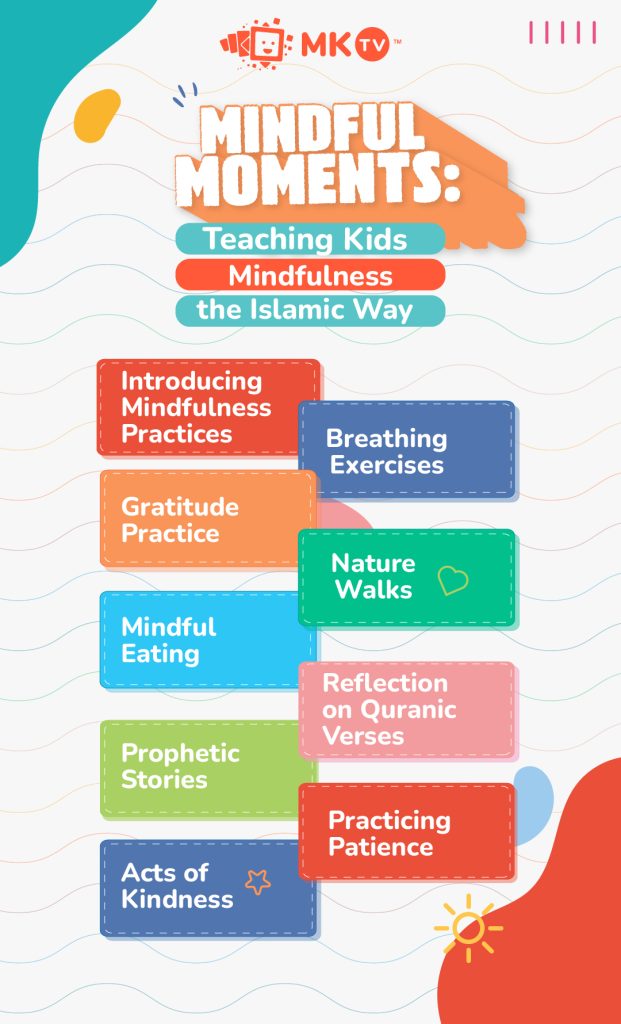Check out our latest ebook – “Raising Mindful Muslim Kids” that dives into a world of emotions, coping strategies, and self-care tips for your little ones!
In today’s fast-paced world, teaching children mindfulness has become increasingly important. Mindfulness is the practice of being fully present in the moment, paying attention to one’s thoughts, feelings, and surroundings without judgment. It helps children develop skills such as focus, self-awareness, and emotional regulation. While mindfulness is a universal concept, it can also be taught in a way that aligns with our religious beliefs and traditions. In this article, we will explore how parents and educators can teach kids mindfulness the Islamic way.
The Importance of Mindfulness in Islam
Islam places great emphasis on mindfulness and inner reflection. The Quran encourages Muslims to be mindful of their actions, thoughts, and intentions. It teaches the concept of “tafakkur,” which means deep reflection and contemplation. The Prophet Muhammad (peace be upon him) also emphasized the importance of being present in the moment and fully aware of one’s surroundings.
By incorporating mindfulness into their daily lives, our children can strengthen their connection with Islam and develop a deeper understanding of Islamic teachings.
Introducing Mindfulness Practices
- Prayer and Meditation: Prayer is an essential part of the Islamic faith, and it can be a powerful mindfulness practice. Encourage children to focus on their prayers, being fully present and engaged in each movement and recitation. Teach them to take a moment of silence after prayer to reflect on their connection with Allah.
- Breathing Exercises: Deep breathing exercises are a fundamental aspect of mindfulness. Teach children simple breathing techniques such as “Box Breathing” or “4-7-8 Breathing.” These exercises can help children relax, reduce stress, and improve concentration.
- Gratitude Practice: Teach children to express gratitude for the blessings in their lives. Encourage them to reflect on the things they are grateful for each day, whether it’s their family, friends, health, or opportunities. This practice cultivates a positive mindset and encourages mindfulness of the present moment.
- Nature Walks: Take children on nature walks and encourage them to observe the beauty of Allah’s creation. Teach them to appreciate the smallest details, such as the colors of flowers or the sounds of birds chirping. Nature walks provide an opportunity for children to connect with their surroundings and practice mindfulness in a peaceful setting.
- Mindful Eating: Teach children to eat mindfully by encouraging them to savor each bite, be aware of the tastes and textures, and express gratitude for the food they consume. This practice promotes mindful eating habits and fosters a sense of gratitude for the provision of Allah.
Incorporating Islamic Teachings

- Reflection on Quranic Verses: Choose specific verses from the Quran that emphasize mindfulness and reflection. Discuss the meaning of these verses with children and encourage them to contemplate their significance in their lives.
- Prophetic Stories: Share stories from the life of Prophet Muhammad (peace be upon him) that highlight moments of mindfulness, presence, and reflection. These stories can serve as powerful examples for children to emulate.
- Practicing Patience: Teach children the importance of patience in Islam and how it relates to mindfulness. Encourage them to pause, take a deep breath, and reflect before reacting to challenging situations.
- Acts of Kindness: Guide children to perform acts of kindness and charity as a way of being present and mindful of the needs of others. Teach them the importance of helping others and encourage them to be mindful of their actions towards others.
Teaching kids mindfulness the Islamic way combines the benefits of mindfulness with the teachings and principles of Islam. By incorporating mindfulness practices into their daily lives, children can cultivate a deeper connection with their faith, develop greater self-awareness, and enhance their overall well-being. These practices can lay the foundation for a lifetime of mindfulness and spiritual growth. May we all strive to raise mindful and conscious Muslim children who are deeply rooted in their faith.

